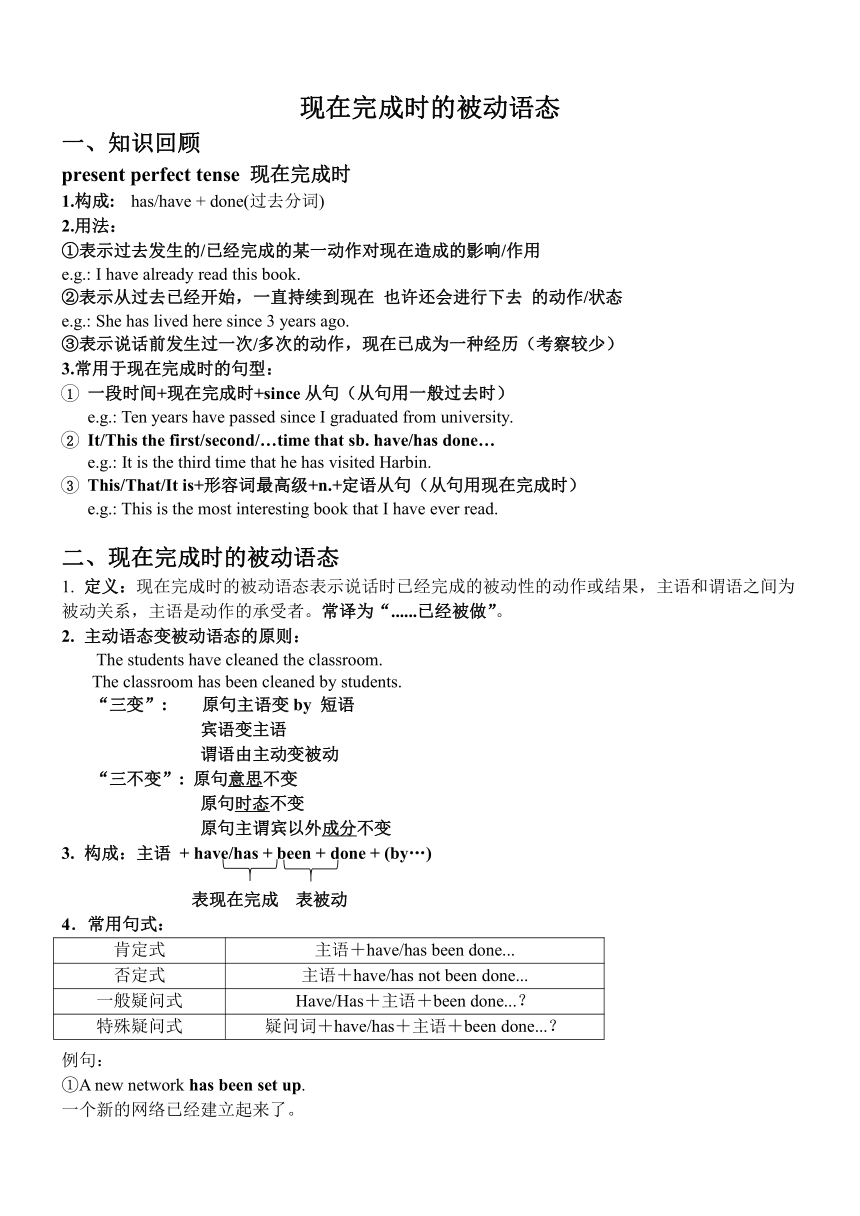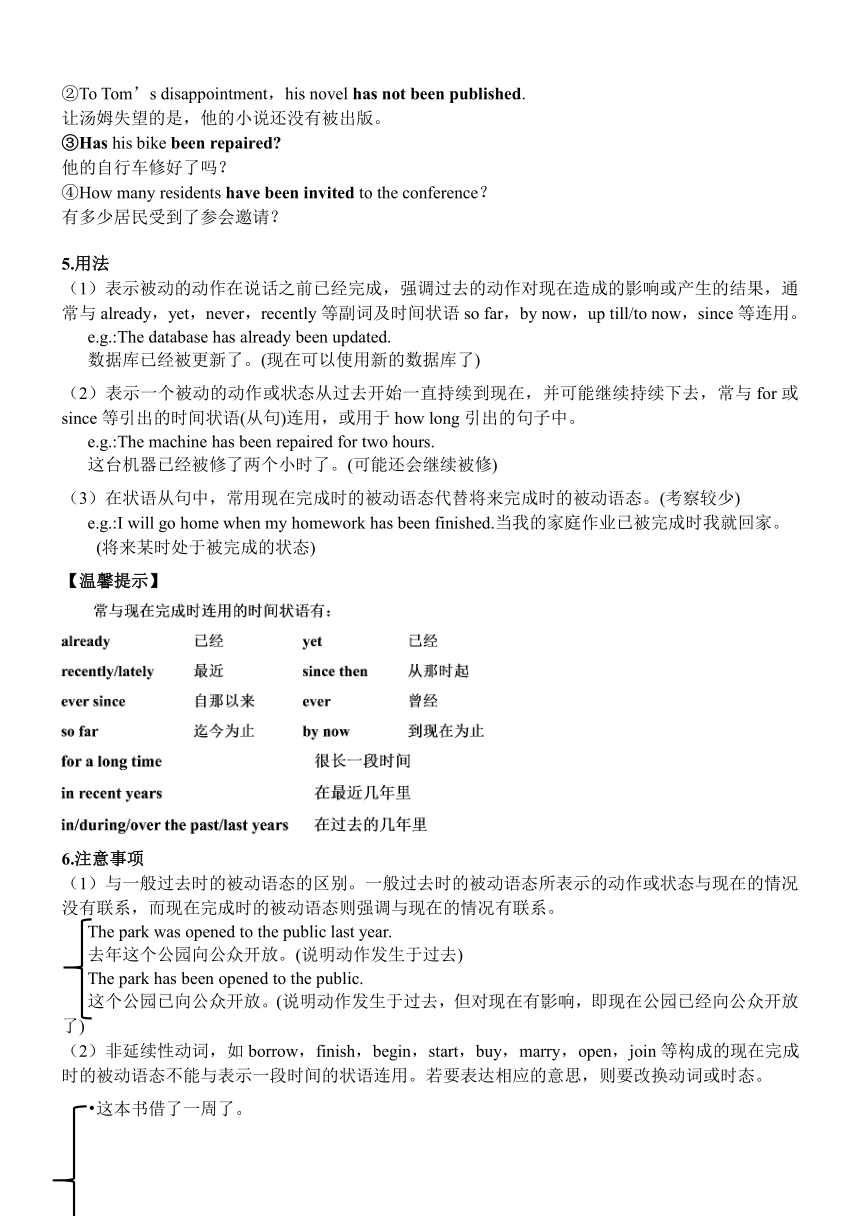现在完成时被动语态知识清单(讲义)-2025届高三下学期英语复习专项
文档属性
| 名称 | 现在完成时被动语态知识清单(讲义)-2025届高三下学期英语复习专项 |

|
|
| 格式 | docx | ||
| 文件大小 | 89.2KB | ||
| 资源类型 | 教案 | ||
| 版本资源 | 人教版(2019) | ||
| 科目 | 英语 | ||
| 更新时间 | 2025-02-15 10:39:12 | ||
图片预览


文档简介
现在完成时的被动语态
一、知识回顾
present perfect tense 现在完成时
1.构成: has/have + done(过去分词)
2.用法:
①表示过去发生的/已经完成的某一动作对现在造成的影响/作用
e.g.: I have already read this book.
②表示从过去已经开始,一直持续到现在 也许还会进行下去 的动作/状态
e.g.: She has lived here since 3 years ago.
③表示说话前发生过一次/多次的动作,现在已成为一种经历(考察较少)
3.常用于现在完成时的句型:
一段时间+现在完成时+since从句(从句用一般过去时)
e.g.: Ten years have passed since I graduated from university.
It/This the first/second/…time that sb. have/has done…
e.g.: It is the third time that he has visited Harbin.
This/That/It is+形容词最高级+n.+定语从句(从句用现在完成时)
e.g.: This is the most interesting book that I have ever read.
二、现在完成时的被动语态
定义:现在完成时的被动语态表示说话时已经完成的被动性的动作或结果,主语和谓语之间为被动关系,主语是动作的承受者。常译为“......已经被做”。
主动语态变被动语态的原则:
The students have cleaned the classroom.
The classroom has been cleaned by students.
“三变”: 原句主语变by 短语
宾语变主语
谓语由主动变被动
“三不变”: 原句意思不变
原句时态不变
原句主谓宾以外成分不变
构成:主语 + have/has + been + done + (by…)
表现在完成 表被动
4.常用句式:
肯定式 主语+have/has been done...
否定式 主语+have/has not been done...
一般疑问式 Have/Has+主语+been done...?
特殊疑问式 疑问词+have/has+主语+been done...?
例句:
①A new network has been set up.
一个新的网络已经建立起来了。
②To Tom’s disappointment,his novel has not been published.
让汤姆失望的是,他的小说还没有被出版。
③Has his bike been repaired
他的自行车修好了吗?
④How many residents have been invited to the conference?
有多少居民受到了参会邀请?
5.用法
(1)表示被动的动作在说话之前已经完成,强调过去的动作对现在造成的影响或产生的结果,通常与already,yet,never,recently等副词及时间状语so far,by now,up till/to now,since等连用。
e.g.:The database has already been updated.
数据库已经被更新了。(现在可以使用新的数据库了)
(2)表示一个被动的动作或状态从过去开始一直持续到现在,并可能继续持续下去,常与for或since等引出的时间状语(从句)连用,或用于how long引出的句子中。
e.g.:The machine has been repaired for two hours.
这台机器已经被修了两个小时了。(可能还会继续被修)
(3)在状语从句中,常用现在完成时的被动语态代替将来完成时的被动语态。(考察较少)
e.g.:I will go home when my homework has been finished.当我的家庭作业已被完成时我就回家。
(将来某时处于被完成的状态)
【温馨提示】
6.注意事项
(1)与一般过去时的被动语态的区别。一般过去时的被动语态所表示的动作或状态与现在的情况没有联系,而现在完成时的被动语态则强调与现在的情况有联系。
The park was opened to the public last year.
去年这个公园向公众开放。(说明动作发生于过去)
The park has been opened to the public.
这个公园已向公众开放。(说明动作发生于过去,但对现在有影响,即现在公园已经向公众开放了)
(2)非延续性动词,如borrow,finish,begin,start,buy,marry,open,join等构成的现在完成时的被动语态不能与表示一段时间的状语连用。若要表达相应的意思,则要改换动词或时态。
这本书借了一周了。
The book has been borrowed for a week. (x)
The book has been kept for a week. (√)
这个工程已经开始多久了?
How long has this project been started (x)
How long ago was this project started (√)
【温馨提示】come/arrive/buy/die/borrow/begin/finish/start等表示短暂意义的瞬间动词的现在完成时,在肯定句中不能与表示一段时间的状语连用。它们必须用相应的表示延续状态的延续性动词(词组)连用。
瞬间动词(词组) 对应的延续性动词(词组)
buy have
borrow keep
die be dead
leave be away
catch/get a cold have a cold
come/go here/there be here/there
begin/start be on
finish/end be over
fall asleep be asleep
turn off be off
join be a member
(3)带有双宾语的动词,如give,send,bring,take,teach,show,tell,make,sing,write,read,sell,buy,tell,pay,lend,pass,promise等,变为被动语态时,可将其中一个宾语变为主语,另一个保留不动。
We have given him a lot of cash.
→He has been given a lot of cash.
→A lot of cash has been given to him.
(4)带有复合宾语的动词变为被动语态时,只能将宾语变为主语,原来的宾补改为主语补足语。原来省略to的不定式作宾补的,被动语态中要用带to的不定式。
I have told them to take their identity cards.
→They have been told to take their identity cards.
我已经告诉他们要带上身份证。
(5)短语动词是一个不可分割的整体,在被动语态中要保持其完整性,其中的介词或副词不可省略。如:It is said that the problem has been looked into. 据说已经调查了这个问题。
【温馨提示】有些短语动词是及物的,也可以用被动语态。主要有以下三种情况:
“及物动词+副词”型
“及物动词 +副词”型的短语动词,如 pick up, work out, find out, carry out, take up, figure out, throw out 等在变成被动语态时,可直接把宾语变成主语,然后把短语动词变成被动形式即可。
Many of my bad habits have been given up. 我已改掉了很多坏习惯。
A new policy was carried out. 新的政策实施了
Our performance is to be put off till next week. 我们的演出将被推迟到下周。
② “不及物动词+介词”型
“不及物动词十介词”型的短语动词,如 look at, look after, listen to, move into, break into 等。
Ancient buildings are carefully looked after. 古代建筑被精心地保护着
The new song is not popular and is seldom listened to. 这支新歌不受欢迎,很少被人听。
③“动词十副词十介词”或“动词十名词+介词”型
这样的短语大多都能变为被动形式,如:look down upon(轻视),do away with (废除;弄死),take care of(关心,照顾),make use of(利用),play a part in(起作用),pay attention to(注意),put up with(忍受)等。有时可把“动词 +名词+介词”型短语动词中的名词变成被动语态的主语。
More attention should be paid to our environment. 应该多注意我们的环境。
Such bad behaviour can't be put up with. 这么恶劣的行为不能容忍。
有的短语动词还可以有两种被动形式。
We should take good care of the old people. 我们应该好好照顾老人。
→ Good care should be taken of the old people
→ The old people should be taken good care of.
I will make full use of my spare time to learn English. 我将充分利用我的空余时间学英语
→Full use will be made of my spare time to learn English
→ My spare time will be made full use of to learn English.
三、现在完成时被动语态的解题步骤
1.找标志:找到句中常与现在完成时连用的副词或时间状语
2.圈主语:找到句中的主语,判断是否为第三人称单数
3.定语态:确定主语与谓语动词之间的被动关系
一、知识回顾
present perfect tense 现在完成时
1.构成: has/have + done(过去分词)
2.用法:
①表示过去发生的/已经完成的某一动作对现在造成的影响/作用
e.g.: I have already read this book.
②表示从过去已经开始,一直持续到现在 也许还会进行下去 的动作/状态
e.g.: She has lived here since 3 years ago.
③表示说话前发生过一次/多次的动作,现在已成为一种经历(考察较少)
3.常用于现在完成时的句型:
一段时间+现在完成时+since从句(从句用一般过去时)
e.g.: Ten years have passed since I graduated from university.
It/This the first/second/…time that sb. have/has done…
e.g.: It is the third time that he has visited Harbin.
This/That/It is+形容词最高级+n.+定语从句(从句用现在完成时)
e.g.: This is the most interesting book that I have ever read.
二、现在完成时的被动语态
定义:现在完成时的被动语态表示说话时已经完成的被动性的动作或结果,主语和谓语之间为被动关系,主语是动作的承受者。常译为“......已经被做”。
主动语态变被动语态的原则:
The students have cleaned the classroom.
The classroom has been cleaned by students.
“三变”: 原句主语变by 短语
宾语变主语
谓语由主动变被动
“三不变”: 原句意思不变
原句时态不变
原句主谓宾以外成分不变
构成:主语 + have/has + been + done + (by…)
表现在完成 表被动
4.常用句式:
肯定式 主语+have/has been done...
否定式 主语+have/has not been done...
一般疑问式 Have/Has+主语+been done...?
特殊疑问式 疑问词+have/has+主语+been done...?
例句:
①A new network has been set up.
一个新的网络已经建立起来了。
②To Tom’s disappointment,his novel has not been published.
让汤姆失望的是,他的小说还没有被出版。
③Has his bike been repaired
他的自行车修好了吗?
④How many residents have been invited to the conference?
有多少居民受到了参会邀请?
5.用法
(1)表示被动的动作在说话之前已经完成,强调过去的动作对现在造成的影响或产生的结果,通常与already,yet,never,recently等副词及时间状语so far,by now,up till/to now,since等连用。
e.g.:The database has already been updated.
数据库已经被更新了。(现在可以使用新的数据库了)
(2)表示一个被动的动作或状态从过去开始一直持续到现在,并可能继续持续下去,常与for或since等引出的时间状语(从句)连用,或用于how long引出的句子中。
e.g.:The machine has been repaired for two hours.
这台机器已经被修了两个小时了。(可能还会继续被修)
(3)在状语从句中,常用现在完成时的被动语态代替将来完成时的被动语态。(考察较少)
e.g.:I will go home when my homework has been finished.当我的家庭作业已被完成时我就回家。
(将来某时处于被完成的状态)
【温馨提示】
6.注意事项
(1)与一般过去时的被动语态的区别。一般过去时的被动语态所表示的动作或状态与现在的情况没有联系,而现在完成时的被动语态则强调与现在的情况有联系。
The park was opened to the public last year.
去年这个公园向公众开放。(说明动作发生于过去)
The park has been opened to the public.
这个公园已向公众开放。(说明动作发生于过去,但对现在有影响,即现在公园已经向公众开放了)
(2)非延续性动词,如borrow,finish,begin,start,buy,marry,open,join等构成的现在完成时的被动语态不能与表示一段时间的状语连用。若要表达相应的意思,则要改换动词或时态。
这本书借了一周了。
The book has been borrowed for a week. (x)
The book has been kept for a week. (√)
这个工程已经开始多久了?
How long has this project been started (x)
How long ago was this project started (√)
【温馨提示】come/arrive/buy/die/borrow/begin/finish/start等表示短暂意义的瞬间动词的现在完成时,在肯定句中不能与表示一段时间的状语连用。它们必须用相应的表示延续状态的延续性动词(词组)连用。
瞬间动词(词组) 对应的延续性动词(词组)
buy have
borrow keep
die be dead
leave be away
catch/get a cold have a cold
come/go here/there be here/there
begin/start be on
finish/end be over
fall asleep be asleep
turn off be off
join be a member
(3)带有双宾语的动词,如give,send,bring,take,teach,show,tell,make,sing,write,read,sell,buy,tell,pay,lend,pass,promise等,变为被动语态时,可将其中一个宾语变为主语,另一个保留不动。
We have given him a lot of cash.
→He has been given a lot of cash.
→A lot of cash has been given to him.
(4)带有复合宾语的动词变为被动语态时,只能将宾语变为主语,原来的宾补改为主语补足语。原来省略to的不定式作宾补的,被动语态中要用带to的不定式。
I have told them to take their identity cards.
→They have been told to take their identity cards.
我已经告诉他们要带上身份证。
(5)短语动词是一个不可分割的整体,在被动语态中要保持其完整性,其中的介词或副词不可省略。如:It is said that the problem has been looked into. 据说已经调查了这个问题。
【温馨提示】有些短语动词是及物的,也可以用被动语态。主要有以下三种情况:
“及物动词+副词”型
“及物动词 +副词”型的短语动词,如 pick up, work out, find out, carry out, take up, figure out, throw out 等在变成被动语态时,可直接把宾语变成主语,然后把短语动词变成被动形式即可。
Many of my bad habits have been given up. 我已改掉了很多坏习惯。
A new policy was carried out. 新的政策实施了
Our performance is to be put off till next week. 我们的演出将被推迟到下周。
② “不及物动词+介词”型
“不及物动词十介词”型的短语动词,如 look at, look after, listen to, move into, break into 等。
Ancient buildings are carefully looked after. 古代建筑被精心地保护着
The new song is not popular and is seldom listened to. 这支新歌不受欢迎,很少被人听。
③“动词十副词十介词”或“动词十名词+介词”型
这样的短语大多都能变为被动形式,如:look down upon(轻视),do away with (废除;弄死),take care of(关心,照顾),make use of(利用),play a part in(起作用),pay attention to(注意),put up with(忍受)等。有时可把“动词 +名词+介词”型短语动词中的名词变成被动语态的主语。
More attention should be paid to our environment. 应该多注意我们的环境。
Such bad behaviour can't be put up with. 这么恶劣的行为不能容忍。
有的短语动词还可以有两种被动形式。
We should take good care of the old people. 我们应该好好照顾老人。
→ Good care should be taken of the old people
→ The old people should be taken good care of.
I will make full use of my spare time to learn English. 我将充分利用我的空余时间学英语
→Full use will be made of my spare time to learn English
→ My spare time will be made full use of to learn English.
三、现在完成时被动语态的解题步骤
1.找标志:找到句中常与现在完成时连用的副词或时间状语
2.圈主语:找到句中的主语,判断是否为第三人称单数
3.定语态:确定主语与谓语动词之间的被动关系
